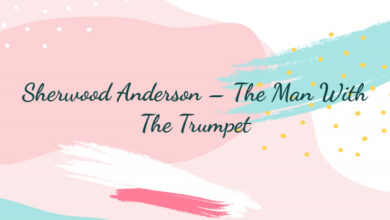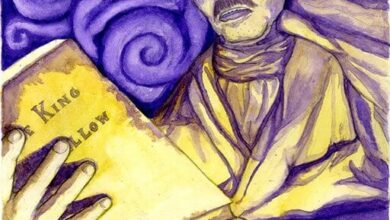
Dick Boyle’s Business Card by Bret Harte
The Sage Wood and Dead Flat stage coach was waiting before the station. The Pine Barrens mail wagon that connected with it was long overdue, with its transfer passengers, and the station had relapsed into listless expectation. Even the humors of Dick Boyle, the Chicago “drummer,”–and, so far, the solitary passenger–which had diverted the waiting loungers, began to fail in effect, though the cheerfulness of the humorist was unabated. The ostlers had slunk back into the stables, the station keeper and stage driver had reduced their conversation to impatient monosyllables, as if each thought the other responsible for the delay. A solitary Indian, wrapped in a commissary blanket and covered by a cast-off tall hat, crouched against the wall of the station looking stolidly at nothing. The station itself, a long, rambling building containing its entire accommodation for man and beast under one monotonous, shed-like roof, offered nothing to attract the eye. Still less the prospect, on the one side two miles of arid waste to the stunted, far-spaced pines in the distance, known as the “Barrens;” on the other an apparently limitless level with darker patches of sage brush, like the scars of burnt-out fires.
Dick Boyle approached the motionless Indian as a possible relief. “YOU don’t seem to care much if school keeps or not, do you, Lo?”
The Indian, who had been half crouching on his upturned soles, here straightened himself with a lithe, animal-like movement, and stood up. Boyle took hold of a corner of his blanket and examined it critically.
“Gov’ment ain’t pampering you with A1 goods, Lo! I reckon the agent charged ’em four dollars for that. Our firm could have delivered them to you for 2 dols. 37 cents, and thrown in a box of beads in the bargain. Suthin like this!” He took from his pocket a small box containing a gaudy bead necklace and held it up before the Indian.
The savage, who had regarded him–or rather looked beyond him–with the tolerating indifference of one interrupted by a frisking inferior animal, here suddenly changed his expression. A look of childish eagerness came into his gloomy face; he reached out his hand for the trinket.
“Hol’ on!” said Boyle, hesitating for a moment; then he suddenly ejaculated, “Well! take it, and one o’ these,” and drew a business card from his pocket, which he stuck in the band of the battered tall hat of the aborigine. “There! show that to your friends, and when you’re wantin’ anything in our line”–
The interrupting roar of laughter, coming from the box seat of the coach, was probably what Boyle was expecting, for he turned away demurely and walked towards the coach. “All right, boys! I’ve squared the noble red man, and the star of empire is taking its westward way. And I reckon our firm will do the ‘Great Father’ business for him at about half the price that it is done in Washington.”
But at this point the ostlers came hurrying out of the stables. “She’s comin’,” said one. “That’s her dust just behind the Lone Pine–and by the way she’s racin’ I reckon she’s comin’ in mighty light.”
“That’s so,” said the mail agent, standing up on the box seat for a better view, “but darned ef I kin see any outside passengers. I reckon we haven’t waited for much.”
Indeed, as the galloping horses of the incoming vehicle pulled out of the hanging dust in the distance, the solitary driver could be seen urging on his team. In a few moments more they had halted at the lower end of the station.
“Wonder what’s up!” said the mail agent.
“Nothin’! Only a big Injin scare at Pine Barrens,” said one of the ostlers. “Injins doin’ ghost dancin’–or suthin like that–and the passengers just skunked out and went on by the other line. Thar’s only one ez dar come–and she’s a lady.”
“A lady?” echoed Boyle.
“Yes,” answered the driver, taking a deliberate survey of a tall, graceful girl who, waiving the gallant assistance of the station keeper, had leaped unaided from the vehicle. “A lady–and the fort commandant’s darter at that! She’s clar grit, you bet–a chip o’ the old block. And all this means, sonny, that you’re to give up that box seat to HER. Miss Julia Cantire don’t take anythin’ less when I’m around.”
The young lady was already walking, directly and composedly, towards the waiting coach–erect, self-contained, well gloved and booted, and clothed, even in her dust cloak and cape of plain ashen merino, with the unmistakable panoply of taste and superiority. A good-sized aquiline nose, which made her handsome mouth look smaller; gray eyes, with an occasional humid yellow sparkle in their depths; brown penciled eyebrows, and brown tendrils of hair, all seemed to Boyle to be charmingly framed in by the silver gray veil twisted around her neck and under her oval chin. In her sober tints she appeared to him to have evoked a harmony even out of the dreadful dust around them. What HE appeared to her was not so plain; she looked him over–he was rather short; through him–he was easily penetrable; and then her eyes rested with a frank recognition on the driver.
“Good-morning, Mr. Foster,” she said, with a smile.
“Mornin’, miss. I hear they’re havin’ an Injin scare over at the Barrens. I reckon them men must feel mighty mean at bein’ stumped by a lady!”
“I don’t think they believed I would go, and some of them had their wives with them,” returned the young lady indifferently; “besides, they are Eastern people, who don’t know Indians as well as WE do, Mr. Foster.”
The driver blushed with pleasure at the association. “Yes, ma’am,” he laughed, “I reckon the sight of even old ‘Fleas in the Blanket’ over there,” pointing to the Indian, who was walking stolidly away from the station, “would frighten ’em out o’ their boots. And yet he’s got inside his hat the business card o’ this gentleman–Mr. Dick Boyle, traveling for the big firm o’ Fletcher & Co. of Chicago”–he interpolated, rising suddenly to the formal heights of polite introduction; “so it sorter looks ez ef any SKELPIN’ was to be done it might be the other way round, ha! ha!”
Miss Cantire accepted the introduction and the joke with polite but cool abstraction, and climbed lightly into the box seat as the mail bags and a quantity of luggage–evidently belonging to the evading passengers–were quickly transferred to the coach. But for his fair companion, the driver would probably have given profane voice to his conviction that his vehicle was used as a “d




